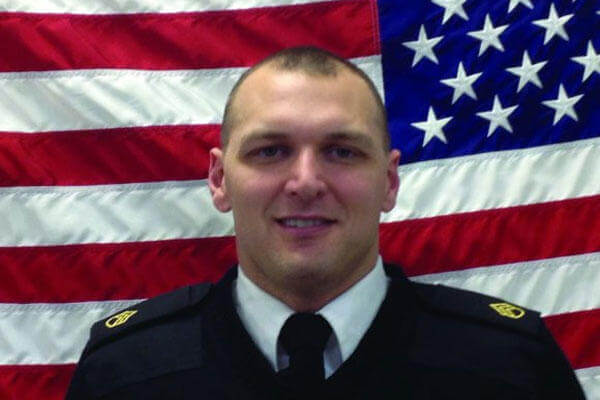GREENVILLE, Mich. -- "Sir, I need help, please. I've been sitting here with a gun in my hand and I want to end my life. I don't know what to do. I feel [like] hopeless, helpless, worthless scum. I want to end it all. Please sir, help me. Nobody cares, and I'm about ready to snap. I can't take it."
These were the frightening words Staff Sgt. Jason DeRosa received Dec. 14, 2012, via Facebook from a high school student he'd previously spoken to about Army opportunities. The 29-year-old recruiter regularly uses Facebook to reach out to students in his high schools; he said it's faster and easier. In his wildest dreams, however, he said he'd never imagined receiving a message like this.
"We'd been sending messages back and forth for a while by the time she started telling me she was in her bedroom holding her father's handgun and thinking of hurting herself," said DeRosa, from Great Lakes Army Recruiting Battalion's Greenville Center.
At first DeRosa wasn't sure if it was a prank, but knew he had to take it seriously without scaring her away. As Facebook was their only link, and not knowing how desperate she really was, he had to be careful about pushing her. Knowing she had recently moved due to her parents' divorce, he felt it was imperative he continue talking to her and find out what was going on so he could get her the proper help. Believing the student was serious about taking her life, DeRosa knew he was her only lifeline at that moment.
"I've taken the Army suicide prevention classes and knew I didn't want to leave a lull in the conversation where something bad could happen," said the nine-year veteran with two combat tours. "She'd asked for help and support before and felt she wasn't receiving it."
DeRosa learned that other people in the house were oblivious to the dangerous situation building behind her closed bedroom door.
"I needed to make conversation with her as a friend and make sure to let her know I was going to get her the help she needed."
Knowing from previous conversations that the student's religious background was similar to his, DeRosa decided to use that as a common thread to relate to her.
"I believe all life is sacred," he told her. And since she didn't think anyone around her cared about her life anymore, he began establishing a platform from which he could ensure her there are people who do care.
"I reminded her that Jesus loved her," he said, using her personal faith to remind her there was nothing worth ending her life for.
"Why don't you just tell me what's wrong?" he asked. "Where are you? Why don't you call my cell phone," DeRosa wrote her.
Being able to talk with her directly seemed to calm her, said DeRosa. She finally put the handgun away and was willing to talk without it.
Overhearing the conversation across the office, Staff Sgt. Kenneth VanHouten notified their Center Commander Sgt. 1st Class Chris Miller, who notified the chain of command.
By that time, DeRosa had calmed the young lady enough to where he felt he could ask for her location and permission to call authorities to help her.
"That moment changed her life," VanHouten said, commending DeRosa for his ability to handle things correctly. "It's hard in [that kind of] situation to deal with things logically and do it well over the phone, but DeRosa's good at not pressuring people and not only seeing them as potential candidates, but helping them with their life."
DeRosa continued finding nonthreatening topics of conversation to engage the young woman while he used his office phone to contact the sheriff's department.
"I just talked to her about all different kinds of things, including about Fort Hood where I'd just served for five years. We discussed the weather and humidity down there and anything I could think of. I also let her know she had help on the way.
"I was listening to her, trying to keep her talking and providing the sheriff with information they needed," said DeRosa.
When the sheriff's department was close to the scene, DeRosa let her know she had help on the way and asked if she would be willing to meet them outside her house. Once he knew the sheriff's deputies had things under control, DeRosa told her she could call him back any time.
VanHouten said he believes DeRosa was able to save the young woman's life because she knew he would be willing to take the time to listen to and help her.
"He was there for her in that moment of vulnerability when she wasn't thinking rationally and needed to realize not everyone was against her," said VanHouten.
DeRosa received the Army Achievement Medal for his actions. He said it is the last statement on the narrative -- that he "directly impacted the life of one person and her family"-- that means the most to him, because it means he was able to make a real difference in someone's life.
As both a dedicated Army NCO and a strong Catholic, he's glad his religious beliefs, Army Values and suicide prevention training provided him the knowledge to save a life.
"For the most part it seemed automatic, knowing what I had to do," said DeRosa. "My faith teaches me that all life is sacred and to help people as much as I can, and the Army's suicide prevention class has taught me to take a plea for help like this seriously; and to stay with the person until they get help.
I guess [investing] an hour every quarter going over suicide prevention isn't such a bad thing."




























